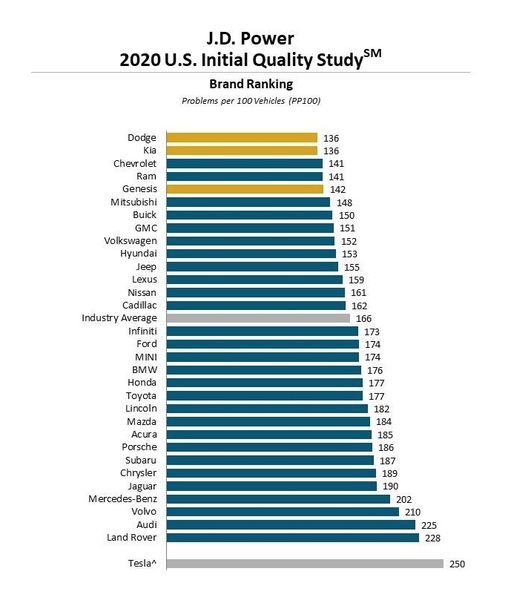
Dodge and Kia have tied for the highest
in overall initial quality, according to J.D. Power.
This is the sixth consecutive year that Kia is the highest-ranked mass market brand in the annual J.D. Power Initial Quality Study, released today. Chevrolet and Ram place third in a tie. Genesis is the highest ranked premium
brand for the fourth consecutive year in the prestigious study, now in its 34th year.
Dodge is the first domestic brand in the study’s history to rank highest. The overall performance of
its parent company, Fiat Chrysler Automobiles, ranks better than industry average for the first time. Dodge leaped seven places from last year’s results. FCA’s overall performance surged
five spots to a fourth-place finish among the 15 companies assessed by J.D. Power.
advertisement
advertisement
The parent corporation receiving the most model-level awards is Hyundai (seven awards), followed by General
Motors (six); BMW AG (three); Ford (three); Nissan (three); and Toyota (two). Among brands, Cadillac and Kia each receive four awards.
Chevrolet Sonic achieves the best score of any
model in this year’s study. Jaguar receives first-ever model-level award with the Jaguar E-Pace.
The study examines problems experienced by owners of new 2020
model-year vehicles during the first 90 days of ownership. Initial quality is determined by the number of problems experienced per 100 vehicles (PP100), with a lower score reflecting higher
quality.
Tesla receives an initial quality score of 250 PP100. The automaker is not officially ranked among other brands in the study as it doesn’t meet ranking criteria.
“Unlike other manufacturers, Tesla doesn’t grant us permission to survey its owners in 15 states where it is required,” said Doug Betts, president of the automotive
division at J.D. Power. “However, we were able to collect a large enough sample of surveys from owners in the other 35 states and, from that base, we calculated Tesla’s
score.”
Redesigned this year, the study measures components that fail and features that are difficult to use, hard to understand or don’t work the way owners want, including
issues related to new technologies.
“The higher problem levels we see in this year’s study don’t mean vehicle quality has worsened; rather, the redesigned study asks
additional questions that allow owners to cite more of the problems that they are experiencing,” said Dave Sargent, vice president of automotive quality at J.D. Power, in a release.
Some key findings include that most domestic brands are above average and the Japanese brands have failed to regain footing. Once regarded as the gold standard in quality, most Japanese brands have
not improved as fast as competitors have and they continue to trail most Korean and domestic brands.
Collectively, this is the best-ever performance by the Detroit automakers—when
compared with the import brands—in the history of the study.
Most premium brands are below average. Premium brands generally equip their vehicles with more complex technology, which can
cause problems for some owners, according to J.D. Power.
Infotainment is the most problematic category. Almost one-fourth of all problems cited by new-vehicle owners relate to infotainment.
Top complaints include issues with built-in voice recognition; Android Auto/Apple CarPlay connectivity; touchscreens; built-in navigation systems; and Bluetooth® connectivity.
The 2020
redesign marks the fifth generation of the study, which is based on a 223 questions organized into nine categories: infotainment; features, controls and displays; exterior; driving assistance (new for
2020); interior; powertrain; seats; driving experience and climate.
This year’s results are based on responses from 87,282 purchasers and lessees of new 2020 model-year vehicles who were
surveyed after 90 days of ownership. The study was fielded from February through May 2020.